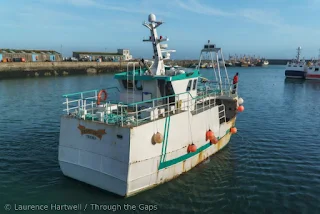The kind of morning weather-wise one might expect for a mid-May #FishyFriday in Newlyn...
with fish like these cracking red mullet...
and turbot from the big beam trawler Enterprise...
head-on monk from the seiner...
and superb tub gurnard from the fishy Saxon Spirit...
cephalopods like these squid are becoming a thing these days, with climate change acknowledged as the main factor in the rise of landings
of Mediterranean octopus, now being landed by almost every type of fishing boat...
in addition to cuttlefish...
there are the the common eight-leggers that have been landed on Newlyn for years...
though landings of their much larger cousins like this haul of 45 boxes are a new phenomenon...
Ian is still perfecting his nunchuck moves...
big beam-trawl plaice from the St Georges...
plus an unusually large haul of congers, must have been scraping those wrecks again..
the inshore boys continue their work harvesting fish ;ike mackerel, bass, pollack, and anything else that swims handy to the shore...
the look that comes from having put ashore a nice little touch of mackerel from the Western shore in a single drift...
what goes up must come down, Inter-Nos comes off the slip...
and heads out across the Bay for a quick run to check all is well down below...
as the Elizabeth N makes her way to the gaps...
the harbour guys are busy installing tyre fenders in preparation for any larger visitors along the Stone quay...
signs of some quality granite sets hide below the tarmac...
not many punts work two-handed, maybe the lobster pots are so full of Mediterranean octopus or nets so full od spiders that an extra pair of hands is needed to get them aboard the Benediction or Ramjet just decided to go for a morning cruise and keep Andrew company!..
work on making good the neglected wrought iron railings is nearing completion as is...
the installation of three new ladders...
replacement mooring rings and capping stone staples.








































